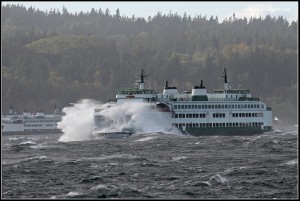
Ferry rides the gale-churned waters on the Mukilteo run in November 2007. George Sickel photo.
Bob Distler, Orcas Island resident and member of the State Transportation Commission, will join his fellow Commissioners on Monday, March 2, to tell the Legislature of the Commission’s recommendations for resolving the chronic ferry funding shortfall, as tasked by the 2007 State Legislature in ESHB 2358.
The Transportation Commission’s major recommendation will be to re-instate a Motor Vehicles Excise Tax (MVET) of one percent of the purchase price for new cars.
Among the allocation of the resultant funds, the Washington State Ferry (WSF) system will receive .21 percent of the revenue collected. These funds will be spent on the WSF capital investment program which includes new ferry construction, major ferry refurbishing (“preservation”) and terminal reconstruction.
WSF has been particularly hard-hit by the repeal of the previous MVET nine years ago, and Distler points out that the capital budget has been raided to make up for the shortfall in operating expenses.
“The state has been stealing from the capital budget to fund operations — it’s no secret,” claims Distler.
He adds that the Transportation Commission’s proposal will have “mix and match” tools to assist the Legislature in working with the Commission’s recommendations.
Another component of the Commission’s proposal will be the “Summer Season Super-Surcharge,” which will not apply to those who pay with frequent-user books. The Transportation Commission also endorses a “moving” fuel surcharge, which WSF proposed, and it found that “fare increases higher than the 2.5 percent assumer by WSF are necessary to close the operating gap.”
In the bargaining process to win support from legislators of the 39 non-ferry served counties, Distler explained that local commitment by the ferry-served counties to relieve the Ferries’ operations’ deficit would come from an increase in ferry fares (or tariffs) for a period of time.
For example, In 2008, the San Juans’ domestic route lost $31 million in operations. Distler says, “As an Orcas resident, I’m saying we need to face the political reality and be careful what we ask for.”
Distler, a self-avowed “numbers man,” calculated that the difference between the current annual 2.5% tariff increase and the proposed 6% tariff increase would amount to $50 per year, assuming a weekly trip for car and driver at $30. “To argue about $50 a year, in my view, is ridiculous. Is that what people are really excited about?”
Distler said, in an interview with Orcas Issues on Feb. 28, that any solution for funding the ferries must be approached at a statewide level in order to stand a prayer of being incorporated in a legislative bill this session (which sets the Transportation Budget for the next two years).
He argues that if ferry riders cover the $213,000,000 deficit in operations through increased fares, they can then say to the rest of the legislature, “You need to come to the table; what are you doing to solve the transportation funding crisis?”
He emphasizes that for those in ferry-served counties to demand increased service at lower cost and focusing on the local situation is not productive, but working together to address the transportation needs of other state counties may provide the political muscle to reinstate a MVET tax which will re-fund the WSF capital budget.
“Be mindful that the whole rest of the state won’t pay for the ferries if we don’t do something for the rest of the state,” Distler cautions.
In the last month, Distler estimates that he met with 35 legislators. He understands that the Transportation Commission is presenting a “relatively difficult” solution to the ferry funding problem, but feels there is no political alternative.
The Transportation Commission’s job was to come up with alternative ways of funding Plan A (now referred to as Scenario A) of the Long-range Plan. Scenario A indicates that 94% of the funding will go to the capital program, while 6% or $213 million, is needed to cover operating costs.
The Transportation Commission will give their formal recommendations to the Joint Transportation Committee on Monday, March 2, along with a plan to introduce to the state legislature. It is up to the Legislature to choose to implement this plan in the Transportation Budget bill this year.
Distler fears that due to the $8 billion shortfall in the State’s general budget this year, the legislature will “punt” the MVET proposal.
He knows that the legislature has “gut-wrenching choices”” to make this year, involving not just cuts, but elimination of “worthy” programs.
But as far as funding WSF goes, Distler says, “We’ve studied everything we can study — the costs, the need, the funding sources. My view is, let’s get on with it.”
The Transportation Commission’s full report will be on their website at LongTermFerryFundingStudy
Later this week:
More from the Bob Distler interview, his comments on Scenario A, state transportation needs, the Federal Stimulus package, and the state budget.
**If you are reading theOrcasonian for free, thank your fellow islanders. If you would like to support theOrcasonian CLICK HERE to set your modestly-priced, voluntary subscription. Otherwise, no worries; we’re happy to share with you.**






